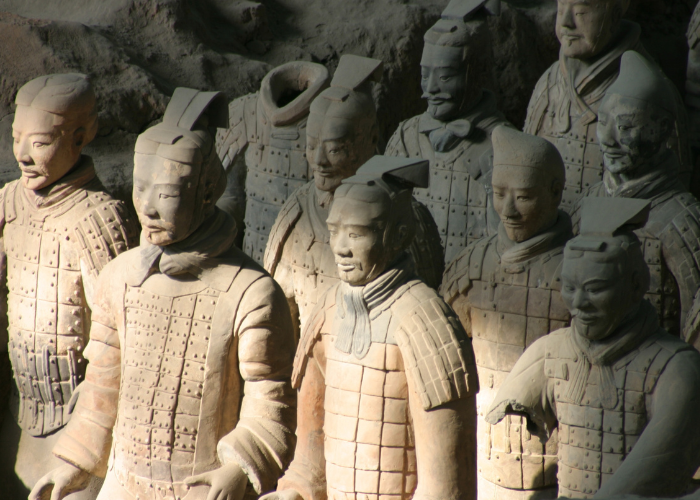Lao Tzu: 300 BCE?
Sima Qian: 90 BCE
A “globalization” exchange from the Chinese classics A-list:
Writing in the seventh Han Dynasty reign (~90 BCE by the western calendar), Grand Historian Sima Qian takes a tolerantly pro-consumer “neoliberal” position as he pans a famous romantic-localist passage from the Tao Te Ch’ing:
Sima Qian: “There must be farmers to produce food, men to extract the wealth of mountains and marshes, artisans to process these things, and merchants to circulate them. There is no need to wait for government orders: each man will do his part as he gets what he desires. So cheap goods will go where they fetch more, while expensive goods will make men search for cheap ones. When all work willingly at their trades, just as water flows ceaselessly downhill day and night, things will appear unsought and people will produce them without being asked.
“[But] Lao Tzu has said that under the ideal form of government:
‘Though states exist side by side, so close they can hear the crowing of each other’s roosters and the barking of each other’s dogs, the people of each state will savor their own food, admire their own clothing, be content with their own customs and delight in their own occupations, and will grow old without ever wandering abroad.’
“Yet if one were to apply this type of government, striving to draw the present age back to the conditions of primitive times and close the eyes and ears of the people, I doubt one would have much success. From ancient times to the present, eyes and ears have longed for the most beautiful forms and sounds, bodies delighted in pleasure and luxury, and hearts swelled with pride at the glory of power and ability. So long have these habits been allowed to permeate the lives of the people, that even if one were to go from door to door preaching [Lao Tzu’s] most subtle arguments, he could never succeed in changing them. Therefore, the highest type of government accepts the nature of the people, the next best leads the people to what is beneficial, the next gives them instruction and orders, and the very worst compels them to act against their nature.”

From the 90 BCE debate to a 2023 summer-reading reprise –
Historian Tara Zahra’s Against the World: Anti-Globalism Between the Wars (PPI trade staff’s choice for best 2023 global-economy book) looks at anti-globalization’s advocates, critics, and effects in the 1930s.
… and Financial Times columnist Rana Foroohar’s Homecoming pitches industrial anti-globalism as a 2020s program.
And back to the classics –
Lao Tzu’s Tao Te Ch’ing (Waley translation, see chapter 80 for the roosters and dogs).
Sima Qian on kings, sages, assassins, merchants, tyrants, economics, and more (Watson translation; see Shi Ji Chapter 129 for the Lao Tzu evaluation and Sima’s survey of early-empire economics and business).
The same author’s panoramic look at the Warring States, the First Emperor (the one with the terra-cotta army), and the rise and fall of the Qin Dynasty.
& a P.S.: What was the point of the army? Edward Burman’s review of recent scholarship.
Ed Gresser is Vice President and Director for Trade and Global Markets at PPI.
Ed returns to PPI after working for the think tank from 2001-2011. He most recently served as the Assistant U.S. Trade Representative for Trade Policy and Economics at the Office of the United States Trade Representative (USTR). In this position, he led USTR’s economic research unit from 2015-2021, and chaired the 21-agency Trade Policy Staff Committee.
Ed began his career on Capitol Hill before serving USTR as Policy Advisor to USTR Charlene Barshefsky from 1998 to 2001. He then led PPI’s Trade and Global Markets Project from 2001 to 2011. After PPI, he co-founded and directed the independent think tank Progressive Economy until rejoining USTR in 2015. In 2013, the Washington International Trade Association presented him with its Lighthouse Award, awarded annually to an individual or group for significant contributions to trade policy.
Ed is the author of Freedom from Want: American Liberalism and the Global Economy (2007). He has published in a variety of journals and newspapers, and his research has been cited by leading academics and international organizations including the WTO, World Bank, and International Monetary Fund. He is a graduate of Stanford University and holds a Master’s Degree in International Affairs from Columbia Universities and a certificate from the Averell Harriman Institute for Advanced Study of the Soviet Union.
Read the full email and sign up for the Trade Fact of the Week